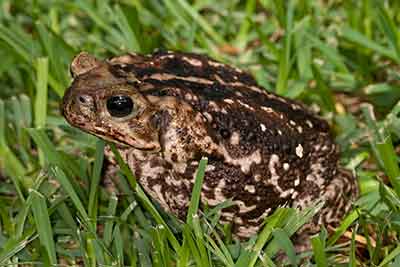Two species of toads in the Unites States can cause severe poisoning, one of which being the Cane Toad, aka Buff Toad. Licking or ingesting one of these toads can cause life threatening signs. The cane toad is typically found in Florida, Texas, Hawaii, Louisiana and other tropical areas. These toads are very large, between 6 to 9 inches long.
How Bufo Toad Poisoning Affects Dogs
 Toads secrete toxic substances through glands on their skin. These substances are secreted in higher amounts when the toad feels threatened. When a larger animal, such as a dog, bites down on a bufo toad the toxin that is on the surface of the toad gets into the mouth of the predator animal (in this case a dog). This toxin is rapidly absorbed into the bloodstream via the mucous membranes (gums and tongue) and causes illness or toxicosis.
Toads secrete toxic substances through glands on their skin. These substances are secreted in higher amounts when the toad feels threatened. When a larger animal, such as a dog, bites down on a bufo toad the toxin that is on the surface of the toad gets into the mouth of the predator animal (in this case a dog). This toxin is rapidly absorbed into the bloodstream via the mucous membranes (gums and tongue) and causes illness or toxicosis.
Understanding the Dangers of Bufo Toad Toxin
Bufo toad toxins attack two main body systems, the central nervous system, and the cardiovascular system. It commonly causes seizures, ataxia, fast heart rate and/or slow heart rate. Along with harming these two body systems we also see local irritation of the mucous membranes and we see gastrointestinal problems as well such as vomiting and diarrhea. The most common presentation for a dog that just got a hold of a bufo toad is either seizures or ataxia. Ataxia is dis-coordination, imbalance, and drunkenness. Patients will often stagger or fall over when trying to walk. Most dogs with seizures from toads often look stiff. The eyes will often move back and forth horizontally in a rapid pattern. There will often be excessive drooling from the mouth and a dead giveaway that a dog got into a toad is that their gums will be very red instead of the usual pink.
Immediate Action: What to Do When Your Dog Encounters a Bufo Toad
The first step is obvious: separate dog and toad right away. Get your dog inside and get a damp towel, or damp clean rag, and use this to wipe the gums. This will physically remove the toxin from the mucous membranes. Do not use running water sources to rinse the mouth out as there have been too many cases of drownings and near-drownings because of this. Once you have wiped the gums get your dog to a veterinarian right away.
Diagnosis and Treatment of Bufo Toad Poisoning
Most cases of toad poisoning in dogs are diagnosed when a pet has the expected signs and a known or suspected exposure to poisonous toads. No specific test is available to confirm toad poisoning. Blood work, radiographs (x-rays) of the chest or abdomen and ECG may be helpful to determine the severity of poisoning and necessary supportive care.
Further treatment will vary depending upon the signs that develop. Intravenous fluids, anti-nausea medications, medications to control the heart rate, muscle relaxants, medications to control seizures and medications to treat abnormal heart rhythms may be necessary. Most patients will spend at least 12 hours in the hospital until being sent home and this, of course, depends on how well they recover.
Prognosis is highly variable and depends on how much toxin was received by the dog, how sensitive the dog is to the toxin, and how long it has been until treatment was initiated. Overall, Bufo toad toxicity is a very common emergency problem that is seen and is normally treated with great success. That being said, it can be very serious and life threatening and should be treated accordingly.
Preventing Bufo Toad Poisoning
Your best bet is to keep close watch of your dog when outside. Bufo toads are most common at dawn and dusk and after heavy rains. Areas with lights during the night, such as near front doors are very common places because they attract bugs. Bodies of water such as lakes and ponds are also very common places to find heavy toad populations since this is where they breed and lay their eggs.
Pet Poison Helpline is available in North America by calling 800-213-6680. Additional information can be found online at www.petpoisonhelpline.com.
If your dog has come into contact with a toad and is exhibiting any symptoms of poisoning, seek immediate veterinary care at our 24-hour emergency veterinarian in Boca Raton. Our experienced team is equipped to handle emergencies and provide life-saving treatment.
Calusa Veterinary Center offers comprehensive care for pets affected by Bufo toad poisoning. Our state-of-the-art facility and skilled emergency veterinarian is dedicated to ensuring your pet's well-being. Contact us today to learn more about prevention and treatment options.
